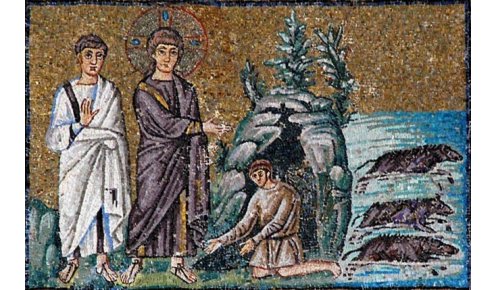08 de julio de 2012
La cura de los dos endemoniados

In the Name of the Father, the Son and the Holy Ghost.
How familiar is this story to us. Yet every time we read it we rediscover something in it which touches our heart, or gives a new light to our mind. And to-day I would like to attract your attention to three features of this passage.
The first is the attitude of the devils, of the powers of evil, to their victims. The powers of evil have no other intention or desire than to take possession of a living creature and to make it both a sufferer and one that will fulfil their will. The Fathers of the Church teach us that the devils can have no direct action in this world; all they can do is enslave human beings and through them work the evil within them. So this is what these powers of evil had intended: to enslave these men and to make them instruments of destruction, but at the same time to make them suffer for it.
When Christ commanded them to leave their victims they cried, shall I say, for a place of refuge, a place where they could dwell and work destruction. And Christ allowed them to in-dwell the pigs. Pigs, in the eyes of Jews, were a symbol of impurity; the request to be lodged in their bodies was a sign for all who could understand - and every Jew could - that they were as impure as the impurest of the animals. But what happened next was a demonstration to people of what happens when we allow ourselves to be possessed of evil, when we allow passions to have power over us - hatred, lust, jealousy, and all the passions of body and soul. Being possessed by them we are doomed to destruction, as this herd ended in death.
We should remember this because we do not always realise how much we are in the grip, in the power of those things which rule our life: likes and dislikes, hatreds, resentments and so on. We are not only possessed, but we are also working evil through our subjection to the power of evil. And the warning is clear: if we only allow evil to take possession of us completely, it will mean death; not physical death, but a total, tragic alienation from all that is life: from God, from love, from beauty, from meaning. We cannot fall out of existence but we can be possessed of an existence which is a ghostly one, an existence without life, without content - a shell that is empty, and yet a torment.
And in contrast to this we see the Lord Jesus Christ, the Son of God become Man. He is the Creator, He is the Lord, He is the Saviour of the whole world; and He forgets everything, as it were, the whole of creation to pay attention to nothing but these two men who are in need of salvation, indeed He is prepared to leave ninety-nine righteous, whole people who do not need Him at that moment alone in order to give all His attention, all His life, indeed all His power to save these two men. In the face of all the need of the world He can see every individual need and respond to it with all His love, all His compassion, all His understanding and all His divine power to save and to heal.
There is a third group of people whom we see in action in this Gospel story; it is the inhabitants of the country. They had known of the desperate condition of these two men; they were told of what Christ did for them; they were told who their master was, who was their tormentor; should they not have come to give glory to God and thank Him for delivering the two men from the power of evil? NO! All they saw in the act of Christ was that they were deprived of their herd of swine. What mattered to them the wholeness and the life and the salvation of these two men? They were deprived of what was important to them, what mattered to them more than a human life, and they asked Christ to leave their borders, to go because they did not want to risk another miracle that would be costly to them. What a tragic - not monstrous, but just tragic contrast between the attitude of God and the attitude of these people.
Let us give thought and ask ourselves, where do we stand? Of course, the first movement we shall have is to say, 'On God's side' - it is not true. When there is a tragic need, and the cost of helping would be perhaps not a disaster but a pain or loss to us, what would we choose? Let us reflect on this: are we really on the side of Christ Who can forget the whole world because His Heart is pierced, transfixed with compassion, or - do we allow our heart to be moved one moment, and then recalculate the cost and turn away from the need?
Let us reflect - because every one of these stories, every parable, every image, every act of God is challenging us: Where do you stand? Who are you? The person possessed, to whatever extent? A disciple of Christ ready to forget everything for the sake of a desperate need? Or rather one of those who say to Christ: Go, go away - you are disturbing our peace, the harmony of our life and our security?
Let us reflect deeply; but not only reflect, take a decision and act. Amen.
|